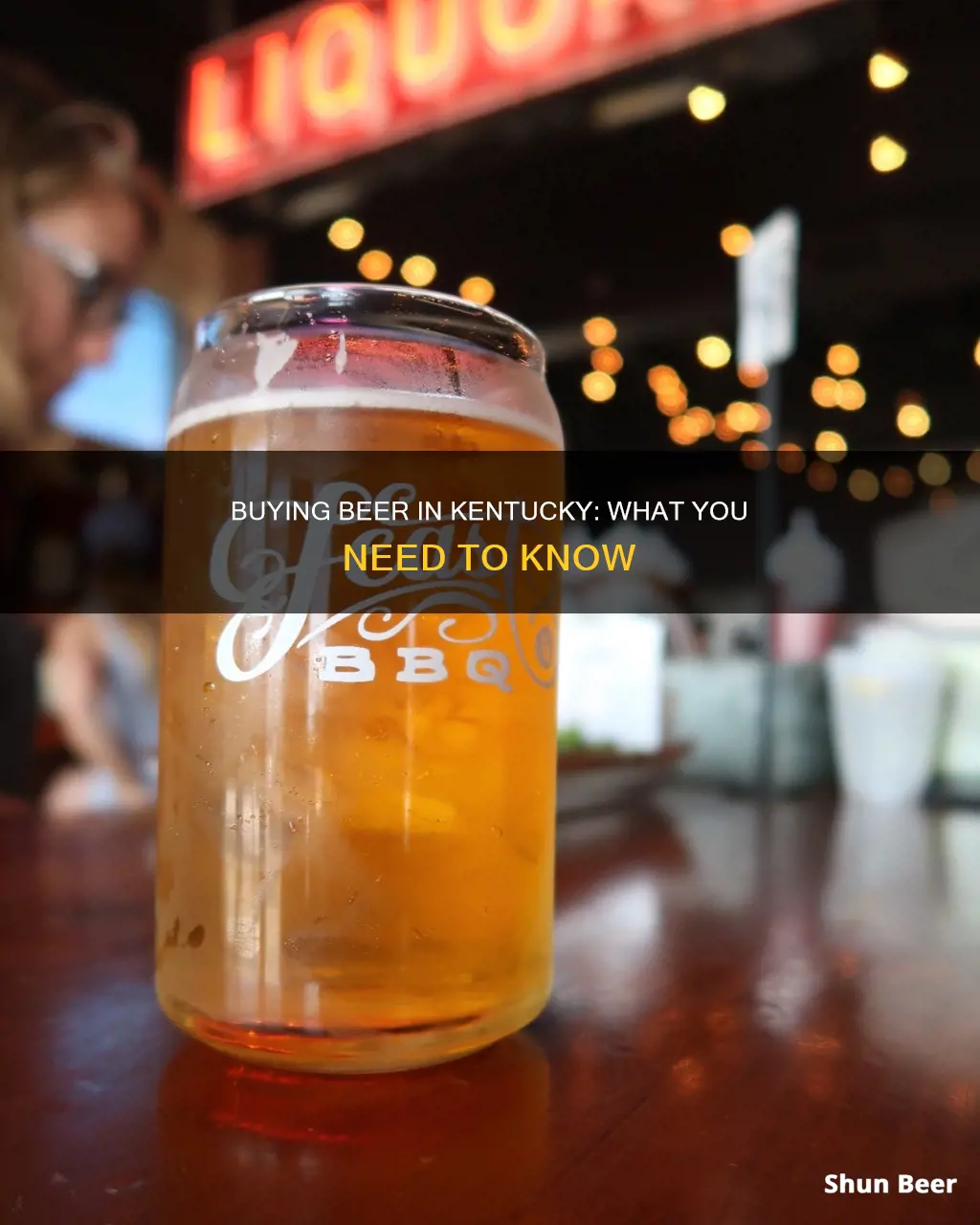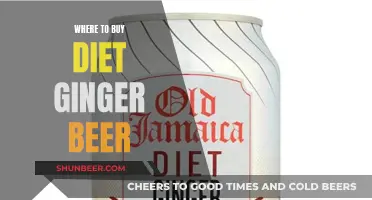
The laws surrounding alcohol sales in Kentucky are complex and vary depending on the county and the type of alcohol being sold. The state has a mix of dry counties, which prohibit all alcohol sales, wet counties, which permit full retail sales, and moist counties, which fall somewhere in between. This means that the answer to the question can you buy beer in Kentucky? is it depends. Beer can be purchased in grocery stores, but only in certain counties, and other types of alcohol may be more restricted. For example, wine and spirits can only be sold in licensed liquor stores or, in some cases, in grocery stores with a separate entrance for that section of the store.
What You'll Learn

Kentucky's alcohol laws are confusing and inconsistent
The confusion starts with licensing. Kentucky issues more than 70 different types of licenses for alcohol sales, including four types of restaurant licenses. The state has issued over 13,000 licenses, which is a lot to keep track of.
One notable inconsistency is that wine can be purchased in a pharmacy, but not in a supermarket. This dates back to Prohibition, when prescriptions for alcohol could be obtained from pharmacies. After Prohibition ended, sales were prohibited in grocery stores to protect minors from exposure to alcohol. While grocery stores can now hold wine and spirits licenses, they must provide a separate entrance and not allow minors to work in that area. In contrast, beer can be sold in the main shopping area of a grocery store.
Another inconsistency is the difference in legal ages for buying and selling alcohol. In Kentucky, you must be 21 to buy alcohol, but only 20 to serve or sell it in a licensed establishment.
The laws can also vary within a county. For example, a "moist" county is one that is mostly dry but has one or more cities that have voted to allow alcohol sales. A "limited" county is one that has approved the sale of alcohol by the drink in qualifying restaurants. There are also special designations for counties that have approved alcohol sales at golf courses, wineries, or historic sites.
The map of alcohol sales status in Kentucky frequently changes due to local option elections, which allow counties, cities, or even individual precincts to vote wet or dry. This can create further inconsistencies, as a dry precinct within a wet county can vote to return to dry status, but a wet precinct within a dry county cannot vote to return to wet status.
The complexity and inconsistencies of Kentucky's alcohol laws have been acknowledged by state officials, who have described them as a "maze of obscure statutory language" and "perplexing". In 2012, Governor Steve Beshear appointed a task force to attempt to streamline the laws, but the situation remains challenging for consumers and businesses alike.
Brewer's Art Beer: Buy Fresh at the Brewery
You may want to see also

Kentucky's alcohol sales status differs by county
A "dry" county prohibits all sales of alcoholic beverages. In contrast, a "wet" county permits full retail sales of alcohol under a state license. A "moist" county is one that has a wet city within a dry county, allowing for a mix of alcohol sales options. As of 2013, there were 38 dry counties, 32 wet counties, and 50 moist or dry counties with special circumstances in Kentucky. The status of alcohol sales in each county can change due to local option elections, which allow counties, cities, or even individual precincts to vote to become wet or dry.
The alcohol laws in Kentucky have been described as confusing and perplexing, with a maze of obscure statutory language. One notable quirk is that wine can be purchased in a pharmacy but not in a supermarket. This dates back to Prohibition, when prescriptions for alcohol could be obtained from pharmacies. After Prohibition ended, sales of alcohol in grocery stores were restricted as it was believed that minors were more likely to be present in those businesses than in pharmacies. While grocery stores can now hold licenses to sell wine and spirits, they must provide a separate entrance and dedicated space for those products, and minors are not allowed to work in that area. Beer, on the other hand, can be sold in the main shopping area of grocery stores.
In terms of purchasing alcohol, Kentucky residents must be at least 21 years old, and the hours for alcohol sales are 6 am to 4 am Monday to Saturday and 1 pm to 4 am on Sunday. Beer can be sold at Walmart, CVS, and Target stores during state-prescribed times, but these stores are not allowed to sell wine or spirits. Gas stations can only sell beer, although some counties permit the sale of beer and wine at gas stations.
Buying Beer in Connecticut on New Year's Day
You may want to see also

Alcohol sales are allowed in some locations
The state's 120 counties are classified as "wet", "dry", "moist", or dry with special provisions. Wet counties permit full retail sales of alcohol under a state license, while dry counties prohibit all alcohol sales. Moist counties occupy a middle ground between the two, with some cities in otherwise dry counties allowing alcohol sales for off-premises consumption.
As of 2013, there were 38 dry counties, 32 wet counties, and 50 counties that were either moist or dry with special circumstances. However, this map of alcohol sales in Kentucky frequently changes due to local option elections. For example, in 2015, a federal judge overturned a ban on sales of liquor and wine in grocery stores, which previously could only sell beer.
In locations where alcohol sales are permitted, beer can be sold in grocery stores, while wine and spirits are sold in licensed liquor stores. However, grocery stores can obtain a license to sell wine and spirits if they provide a separate entrance and section of the store for these products, and do not allow minors to work in this section.
Kentucky's alcohol laws also include several other quirks and inconsistencies. For example, wine can be purchased in a pharmacy but not in a supermarket. The legal age to purchase alcohol is 21, but individuals can serve alcohol in licensed establishments from the age of 20, and sell beer from the age of 18.
Iowa's Beer Laws: Gas Station Purchases Explained
You may want to see also

Alcohol sales are prohibited in some locations
In "dry" counties, all sales of alcoholic beverages are prohibited. In "wet" counties, sales of alcoholic beverages for on-site or off-site consumption are allowed in at least some areas outside of incorporated cities. However, even within these "wet" counties, there may be dry precincts. For example, Louisville and Lexington, the state's two consolidated city-county governments, are both "wet", but a few precincts in Louisville are dry.
"Moist" counties fall somewhere between "dry" and "wet". This classification typically refers to an otherwise dry county where one or more specific cities have voted to allow alcohol sales for off-premises consumption. For instance, thirty-five cities in 30 counties are wet cities located in dry counties, and these counties are considered "moist".
The remaining counties are classified as "dry with special provisions", which means they have approved the sale of alcohol under specific circumstances, such as at qualifying restaurants, golf courses, wineries, or historic sites.
The laws governing alcohol sales in Kentucky are complex and subject to change due to local option elections, which allow counties, cities, or individual precincts to vote to expand or restrict alcohol sales. This has resulted in a patchwork of regulations that vary from one location to another.
Best Places to Buy Medalla Beer
You may want to see also

Alcohol sales are restricted in some locations
Dry counties prohibit all sales of alcoholic beverages. Wet counties permit full retail sales of alcohol under a state license, but many wet counties also have dry precincts. Moist counties are those that are mostly dry but have one or more specific cities that have voted to allow alcohol sales for off-premises consumption.
Additionally, there are limited counties, which are dry counties that have approved the sale of alcohol by the drink at qualifying restaurants. There are also golf course counties, which are dry counties that have approved the sale of alcohol by the drink at a qualifying golf course. Winery counties are dry counties that have approved the operation of a winery. Qualified Historic Site (QHS) counties are dry counties that have approved the sale of alcohol by the drink at a qualifying historic site.
The laws governing alcohol sales in Kentucky can vary from county to county and even from precinct to precinct within a county. For example, a dry county may have a wet city located within it, and a wet county may have dry precincts. The laws can also change over time as communities hold local option elections to expand or restrict alcohol sales.
The complexity of Kentucky's alcohol laws can be attributed to politics and the differing opinions on alcohol sales among communities. The local option election laws were created because some communities wanted alcohol sales while others did not. As a result, the state's alcoholic beverage control laws are a patchwork of sometimes conflicting provisions.
The restrictions on alcohol sales in Kentucky also vary depending on the type of alcohol and the type of retailer. For example, wine can be purchased in a pharmacy but not in a supermarket. Grocery stores can sell beer in the main shopping area but must have a separate entrance and shop to sell wine and spirits. Gas stations can only sell beer, although some counties also allow gas stations to sell wine and beer.
Buying Beer at Florida Gas Stations: Is it Possible?
You may want to see also
Frequently asked questions
Yes, beer can be purchased in Kentucky, but the laws surrounding alcohol sales vary by county and are subject to change.
Beer can be purchased in liquor stores, retailers, grocery stores, and gas stations. Grocery stores and gas stations can only sell beer within state-prescribed times.
Yes, Kentucky has an open container law, which means that any previously opened alcohol containers must be stored in the trunk of your car.
Yes, but only between 1 pm and 4 am.
The legal drinking age in Kentucky is 21, but you can serve alcohol in a licensed establishment from the age of 20.







